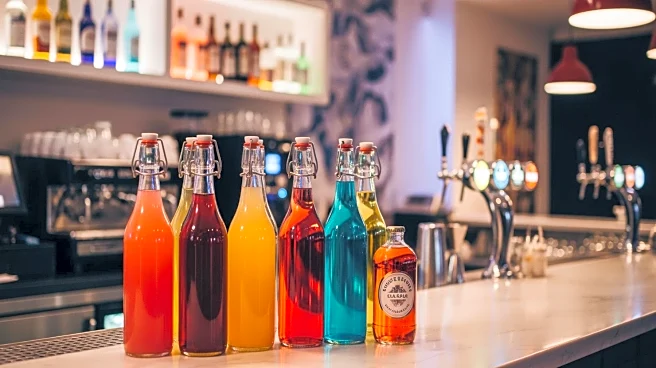What's Happening?
The beverage industry is witnessing a significant shift towards no- and low-alcohol options, largely driven by Gen Z and Millennials. According to Keurig Dr Pepper's State of Beverages 2025 Trend Report,
over 60% of these demographics prefer alcohol-free drinks in social settings. This trend is part of a broader 'sober-curious' movement that has evolved into a lifestyle choice, emphasizing health and wellness. The global non-alcoholic drinks market is valued at $1.4 trillion, with the low-alcohol market projected to grow at a 5.95% CAGR, reaching $28.5 billion by 2030. This shift is prompting innovation across the industry, with non-alcoholic beverage launches outpacing alcoholic ones. Major brands like Heineken and Stella Artois are entering the space, capitalizing on the sector's success.
Why It's Important?
The rise of no- and low-alcohol beverages is reshaping the beverage industry, presenting opportunities for innovation and wellness-driven products. This trend reflects changing social norms, where alcohol is increasingly seen as optional for socializing and celebrations. The movement is giving rise to alcohol-free bars and sober events, indicating a cultural shift towards mindful drinking. For producers, retailers, and hospitality leaders, this trend offers a chance to redefine the future of drinking by investing in products that align with evolving consumer preferences. The industry stands to benefit from catering to a health-conscious market, potentially leading to increased sales and brand loyalty.
What's Next?
As consumer demand for no- and low-alcohol options continues to grow, the industry is poised for further expansion. Brands that focus on innovation, authenticity, and wellness-driven experiences are likely to lead the next wave of growth. There is potential for expansion into untapped categories, such as functional beverages that support sleep and focus, and premium offerings that rival traditional spirits. The rise of alcohol-free venues and sober social spaces opens doors for partnerships and community-building. The industry has the opportunity to shape a more inclusive, health-conscious future by responding to these trends.
Beyond the Headlines
The shift towards no- and low-alcohol beverages may have deeper implications for societal attitudes towards alcohol consumption. As younger generations redefine social drinking, there could be long-term changes in how alcohol is perceived culturally. This movement might also influence public health policies and initiatives aimed at reducing alcohol-related harm. Additionally, the trend could lead to ethical considerations regarding marketing practices and the portrayal of alcohol in media.










